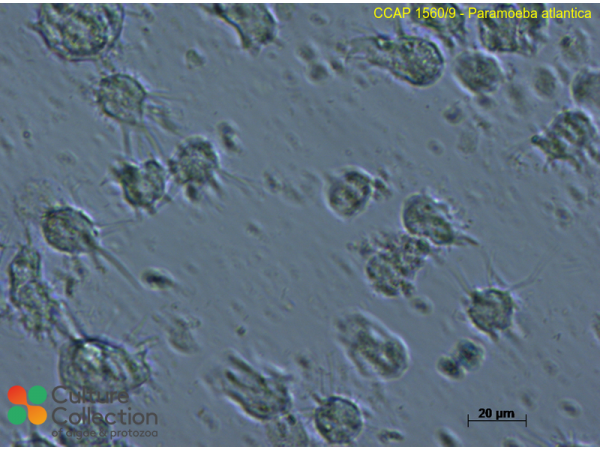References [ 5 ]
Kudryavtsev A, Pawlowski J & Hausmann K (2011) Description of Paramoeba atlantica n. sp. (Amoebozoa, Dactylopodida) - a marine amoeba from the eastern Atlantic, with emendation of the Dactylopodid families. Acta Protozoologica 50: 239-253.
DOI: none
Kudryavtsev A (2014) Paravannella minima n. g. n. sp. (Discosea, Vannellidae) and distinction of the genera in the vannellid amoebae. European Journal of Protistology 50: 258-269.
Pánek T, Zadrobílková E, Walker G, Brown MW, Gentekaki E, Hroudová M, Kang S, Roger AJ, Tice AK, Vlcek C & Cepicka I (2016) First multigene analysis of Archamoebae (Amoebozoa: Conosa) robustly reveals its phylogeny and shows that Entamoebidae represents a deep lineage of the group. Molecular Phylogenetics and Evolution 98: 41-51.
Cavalier-Smith T, Chao EE & Lewis R (2016) 187-gene phylogeny of protozoan phylum Amoebozoa reveals a new class (Cutosea) of deep-branching, ultrastructurally unique, enveloped marine Lobosa and clarifies amoeba evolution. Molecular Phylogenetics and Evolution 99: 275-296.
Collins C, Hall M, Fordyce MJ & White P (2018) Survival and growth in vitro of Paramoeba perurans populations cultured under different salinities and temperatures Protist -: -.
Division/Phylum: Amoebozoa Class: Discosea
Note: for strains where we have DNA barcodes we can be reasonably confident of identity, however for those not yet sequenced we rely on morphology
and the original identification, usually made by the depositor. Although CCAP makes every effort to ensure the correct taxonomic identity of strains, we cannot guarantee
that a strain is correctly identified at the species, genus or class levels. On this basis users are responsible for confirming the identity of the strain(s) they receive
from us on arrival before starting experiments.
For strain taxonomy we generally use AlgaeBase for algae and
Adl et al. (2019) for protists.
| Attributes |
| Authority | Kudryavtsev, Pawlowski & Hausmann 2011 |
| Isolator | Kudryavtsev (2009) |
| Collection Site | bottom sediments, deep sea Great Meteor Seamount, Eastern Atlantic Ocean |
| Notes |
Isolation: enrichment cultivation with subsequent purification by pipetting; RV Meteor cruise M79/1, sample M79/1#621; Depositor notes: culture grows well and achieves high densities, but only if culture vessel is sealed with parafilm. If the dish is left unsealed the cells die out very quickly; A typical scale-bearing Paramoeba 20-70 microns in length with dactylopodid morphotype and a parasome (a kinetoplastid symbiont near the nucleus); one of the few amoebae isolated from the deep sea. |
| Axenicity Status |
Bacteria present |
| Area |
Atlantic |
| Country |
High Seas |
| Environment |
Marine |
| GMO |
No |
| Group |
Protozoa |
| Latitude |
29 36.29' N |
| Longitude |
28 59.12' W |
| In Scope of Nagoya Protocol |
No |
| ABS Note |
Collected pre Nagoya Protocol. No known Nagoya Protocol restrictions for this strain. |
| Collection Date |
c 2009 |
| Pathogen |
Not pathogenic: Hazard Class 1 |
| Strain Maintenance Sheet |
|
| Toxin Producer |
Not Toxic / No Data |
| Type Culture |
Yes |
| Taxonomy WoRMS ID |
|

